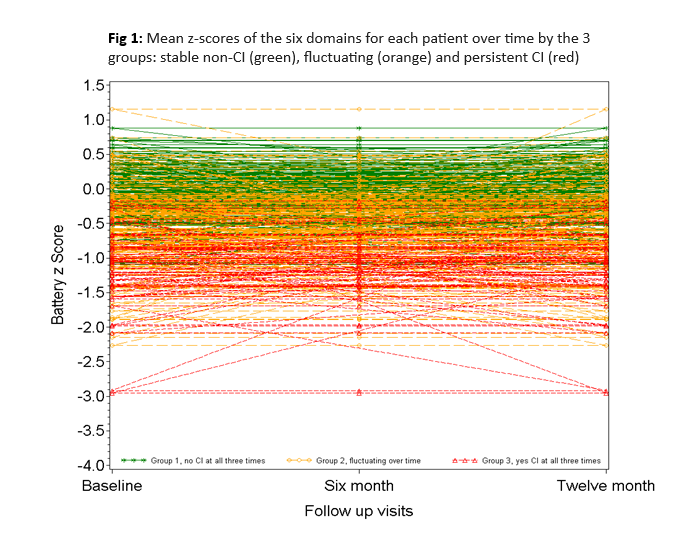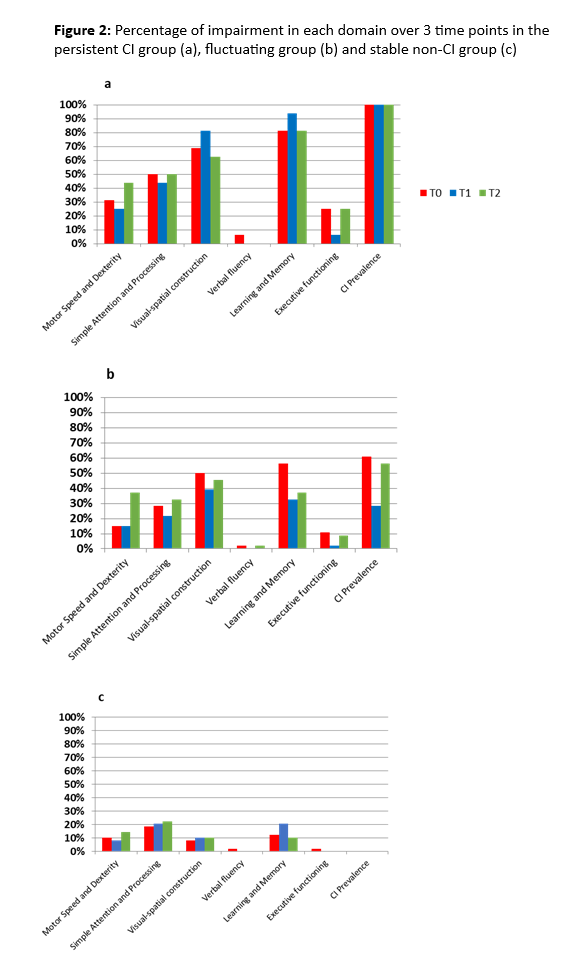Session Information
Date: Monday, November 11, 2019
Title: 3S082: SLE – Clinical II: Flares & Morbidity of SLE (1824–1829)
Session Type: ACR Abstract Session
Session Time: 2:30PM-4:00PM
Background/Purpose: Cognitive impairment (CI) is a common manifestation of systemic lupus erythematosus (SLE). The course of CI in SLE patients has been described as persistent in some patients and fluctuating in others. The objective was to describe the intra-individual course of CI over time, determine the severity of CI and the affected domains, over a 1-year period.
Methods: One-hundred and eleven consecutive SLE patients, aged 18-65 years, from a single centre (July 2016-March 2019) were included. Patients were administered the American College of Rheumatology (ACR) Neuropsychological Battery (NB) at baseline (T0), 6 months (T1) and 12 months (T2). Patients’ scores were compared to a normative data to obtain z-scores. CI was operationalized on the NB as a z-score of ≤-1.5 on ≥2 domains. Six domains were studied: simple attention and processing speed, visual-spatial construction, verbal fluency, learning and memory, executive functioning and manual motor speed and dexterity. Patients were defined as persistent CI if they had CI over 3 time-points (T0, T1 and T2), as stable non-CI if they did not have CI in any time-point, or as fluctuating CI if they had CI on 1-2 assessments. The severity of impairment of CI was determined based on the mean z-score of all 6 domains.
Results: : One-hundred and eleven patients (90% female) completed 3 assessments at T0, T1 and T2. The mean age was 43.6 ± 12 years and SLE duration at enrolment was 15.2 ± 11 years. Fifty-six percent (62/111) experienced CI at some point over one year. The prevalence of CI was 39.6%, 26.1% and 37.8% at T0, T1 and T2 respectively. Sixteen patients (14.4%) experienced persistent CI, 46 (41.4%) fluctuating CI and 49 patients (44.1%) were stable non-CI. Mean z-score of all 6 domains for each patient at each time point by the 3 groups (Fig. 1) showed almost complete separation of the groups, with the persistent CI patients displaying lower mean z-score than the fluctuating CI patients – implying more severe CI. Percentage of impairment of the 6 different domains in the 3 groups (Fig. 2) revealed the most affected domain over time was learning and memory followed by visual-spatial construction, simple attention and processing and motor speed and dexterity. Verbal fluency and executive functioning were not significantly affected. There was no marked change over time in the domains involvement of the persistent CI group. The most affected domains in the fluctuating CI group were similar and there was more variation in the degree of impairment of the involved domains over time.
Conclusion: Fifty-six percent (62/111) of patients experienced CI at some point over a one-year period. While CI fluctuated in 74% (46/62) of patients, 26% (16/62) experience persistent CI across all time points. Although the same domains were affected in fluctuating and persistent CI groups, fluctuating patients displayed less severe CI with more variation in the affected domains compared to persistent CI patients. Our results support the close monitoring of cognition in patients with SLE and further research into the causes and nature of CI in SLE patients.
To cite this abstract in AMA style:
Tayer-Shifman O, Beaton D, Green R, Ruttan L, Wither J, Tartaglia M, Kakvan M, Lombardi S, Anderson N, Su J, Bonilla D, Zandy M, Choi M, Fritzler M, Touma Z. Describing Intra-Individual Cognitive Function Course over Time in Lupus Patients: Persistent and Fluctuating Cognitive Impairment, Affected Cognitive Domains, and Severity [abstract]. Arthritis Rheumatol. 2019; 71 (suppl 10). https://acrabstracts.org/abstract/describing-intra-individual-cognitive-function-course-over-time-in-lupus-patients-persistent-and-fluctuating-cognitive-impairment-affected-cognitive-domains-and-severity/. Accessed .« Back to 2019 ACR/ARP Annual Meeting
ACR Meeting Abstracts - https://acrabstracts.org/abstract/describing-intra-individual-cognitive-function-course-over-time-in-lupus-patients-persistent-and-fluctuating-cognitive-impairment-affected-cognitive-domains-and-severity/


